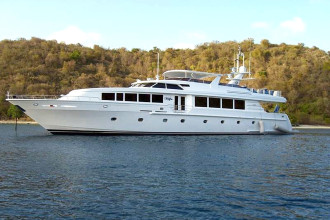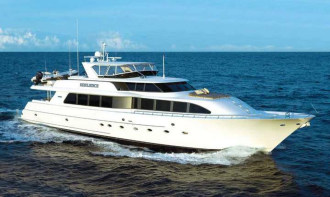There's a new trend in the boating industry. Yacht owners want to fractionalize their boats to cushion costs. Sherpareport spoke with Dr. Loren Simkowitz, Director of Operations at Monocle Fractional Yachts, to get the bigger picture.

"People have become more fiscally prudent," says Simkowitz. "Fractional ownership makes more sense in this economy. The costs of boats, gas and operating expenses have increased which makes sharing quite appealing. A yacht is not like a car or computer that you use every day. Most owners only use their boats four to six weeks a year - so why not split it up and get some money back?"
The increased demand for fractional yacht ownership has led Monocle to actively pursue this new avenue. The company currently has 10 boats on order, which can take at least half a year each to build - not enough to meet growing client needs. To solve this supply/demand issue, Monocle started attracting potential sellers. "It's a good marriage for all. The owners want to keep their costs down and we have clients who are looking for a boat to use without having to purchase it outright," says Simkowitz.
Monocle has had approximately half a dozen inquires from yacht owners this year and is hoping to attract even more in the future. It is a good deal for the owners. They get money for selling a portion of the boat, and have less operating, maintenance and storage costs because the boat is now under Monocle management.
So far most requests to join Monocle's fractional program have originated from Europe, Dubai and Mexico. Monocle has various global offices offering close-to-home storage for these owners. However, yachts typically will be in two locations per year (i.e., St. Barts in the winter and the Mediterranean in the summer).
Monocle's Fractional ProgramSince 1964, Monocle has offered yachting experiences to the affluent. Simkowitz launched the fractional portion of the company in 2000. "We opened up the world of yachting to everyone. The only way you could do it before was to charter a boat or buy it straight out. This way everyone wins," says Simkowitz.
The Monocle fleet consists of 50 yachts. Every boat is divided into 10 shares for four-weeks of usage per share. Clients can buy multiple shares if they choose. Shares start at $400,000 for initial deposits, plus $30,000 annually for maintenance.
"The company is very price conscious. We take the cost of the boat and operating expenses and divide it into equal shares. There is no profit involved which is why we are able to keep costs down," explains Simkowitz.
Yachts coming into the program, by owners who are looking to sell shares, must meet certain criteria. Each boat should:- be at least 100 ft.
- have four state rooms
- be equipped for a staff of four
Simkowitz explains why it is so important to be selective with the boats that come in. "We offer a higher level of service. Our crew members are not hired on a seasonal basis-they are professional, licensed, career people who stay with the boat for years. As a service company, we must set a standard of excellence and maintain it."

Shareholders can swap weeks with other owners and go anywhere in the world they desire. Monocle uses a rotating schedule to facilitate fairness in scheduling. Each owner gets two summer and two winter weeks for multiple yachting experiences. They have a concierge service to coordinate all swaps and schedules.
Since not every boat is equal, there could be extra fees involved in swapping. For instance, if a shareholder of a 100 ft boat wants to swap with at 150 ft boat there will be additional costs because the operating expenses are greater on a larger boat. The same thing goes for a boat that is traveling to New England vs. Europe. It simply costs more to take a boat to Europe so the fees will go up.
There seems to be a trend here, just the other week we reported how owners of private jets were also moving into fractional aircraft ownership and jet cards.
Use this table to compare other fractional yacht providers.

